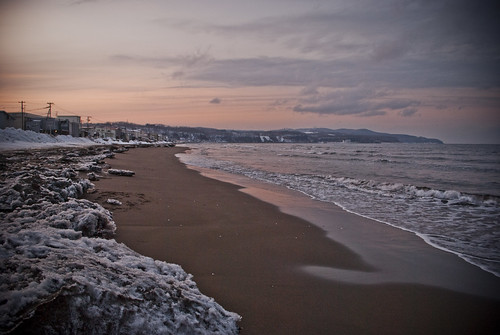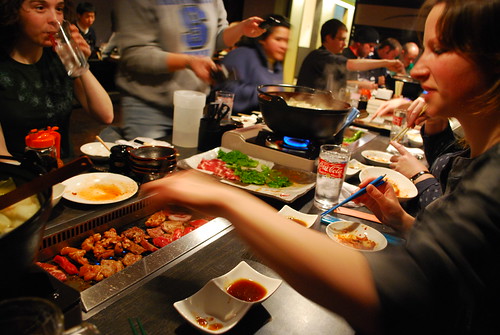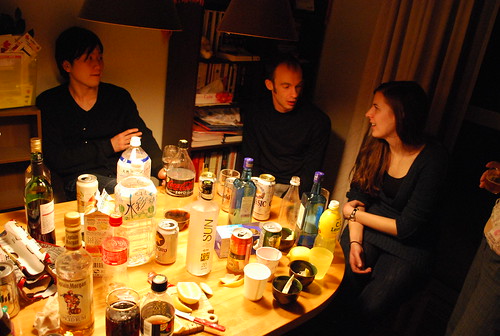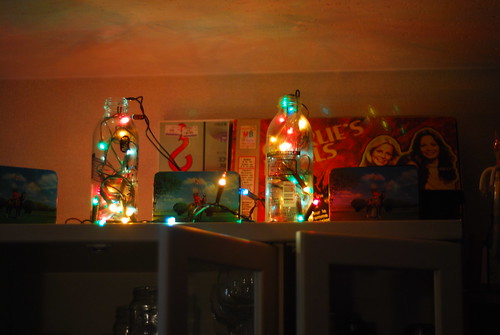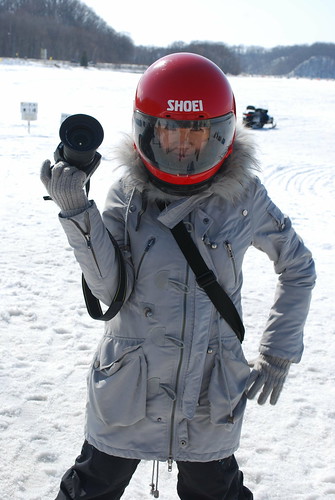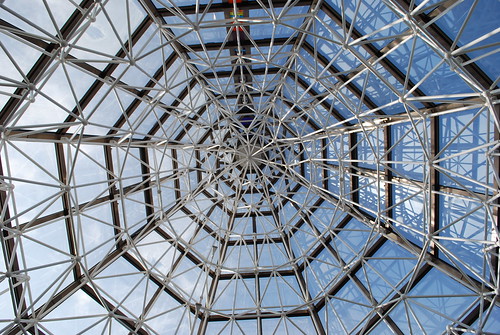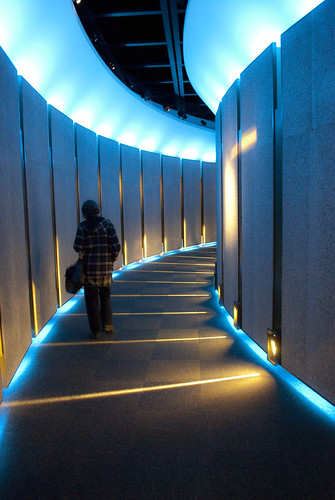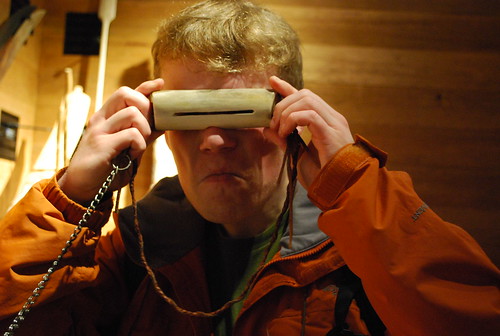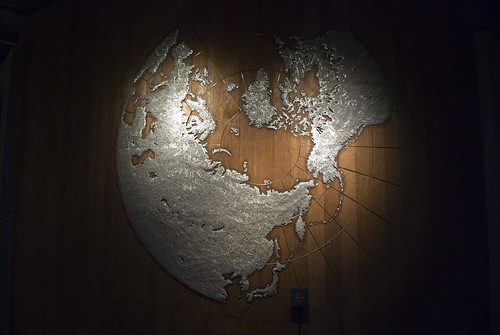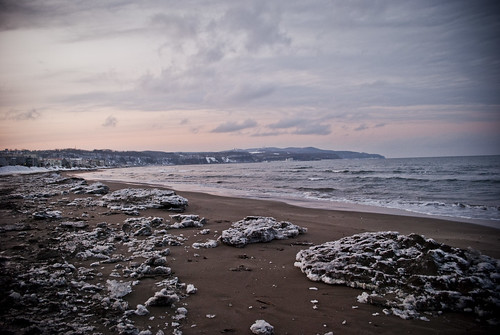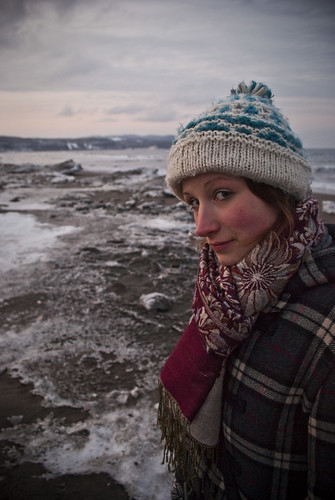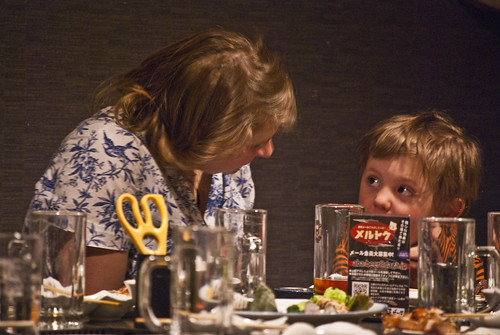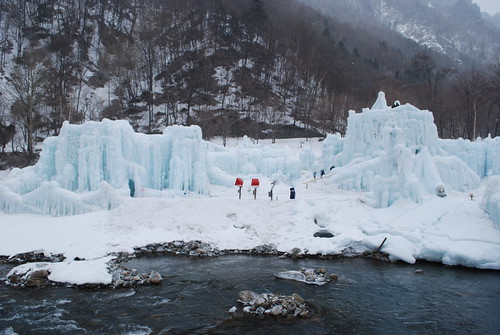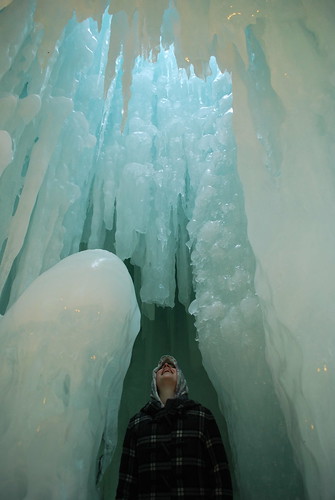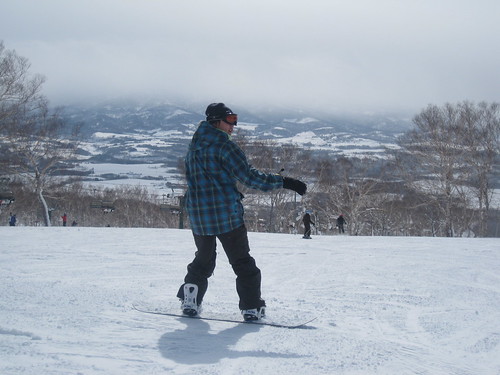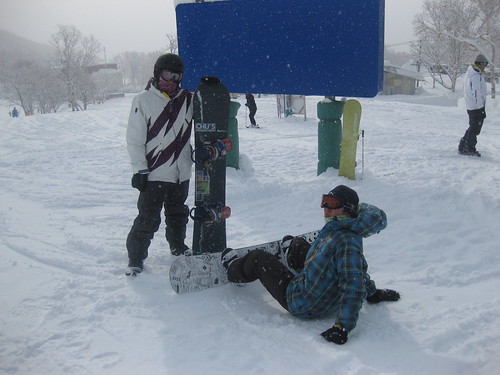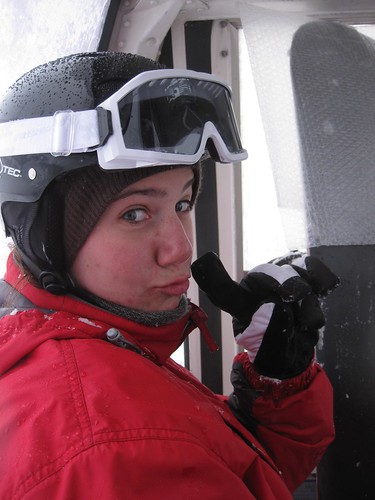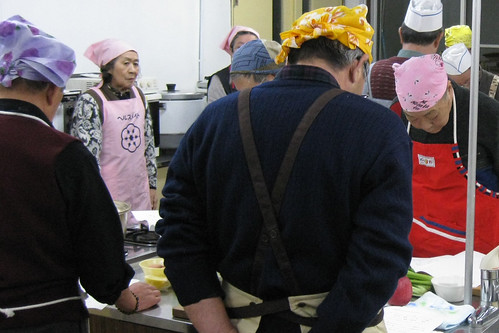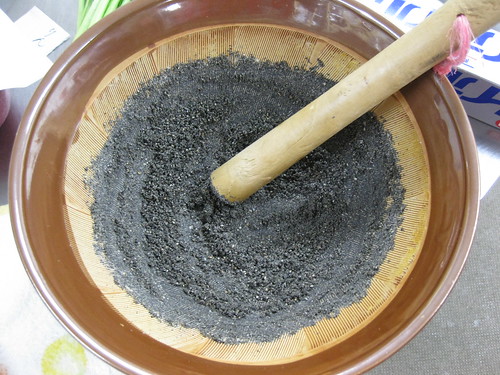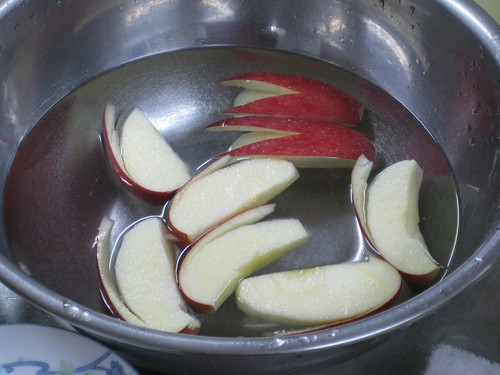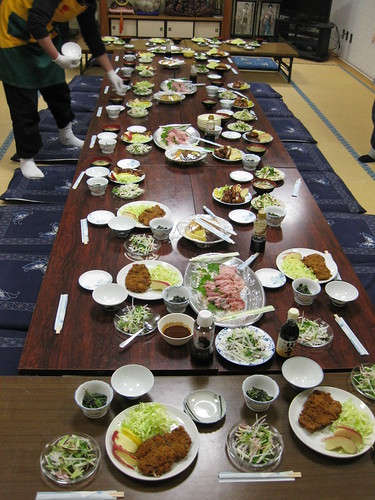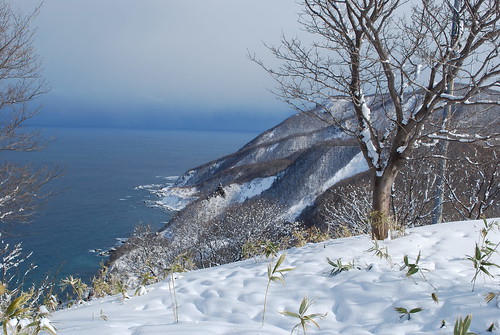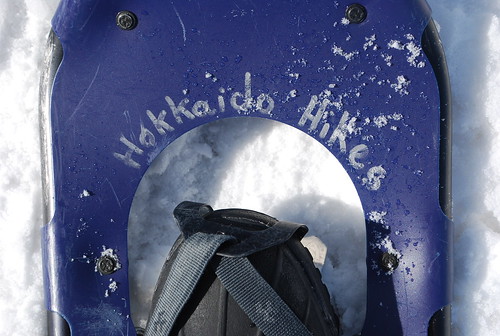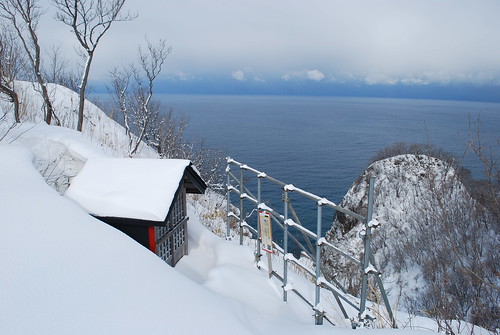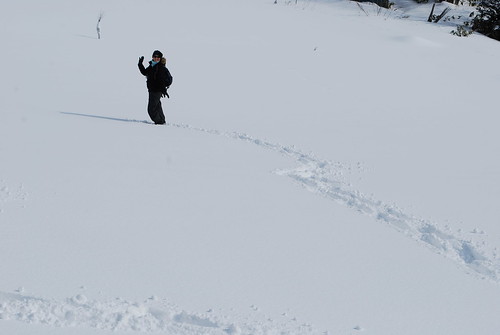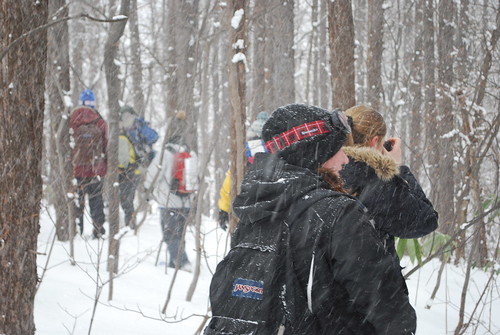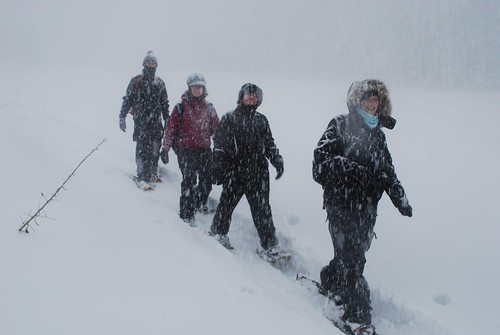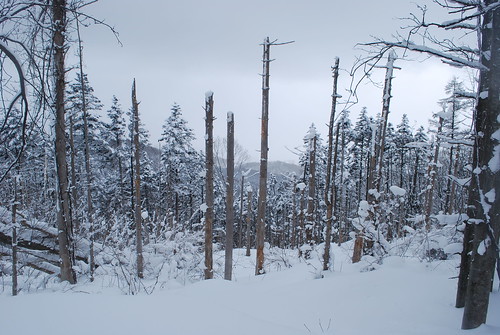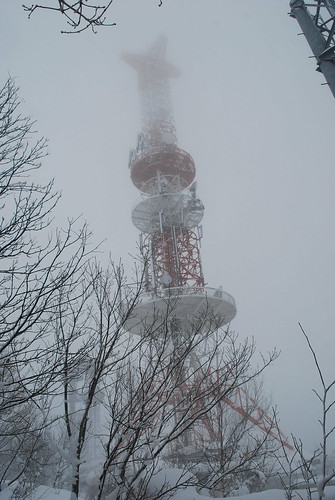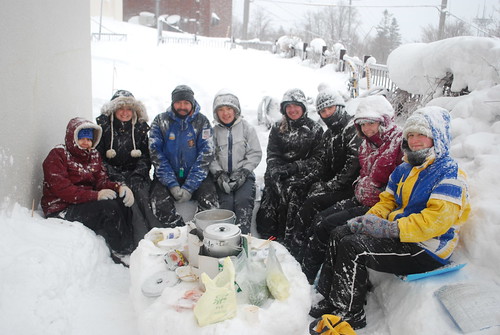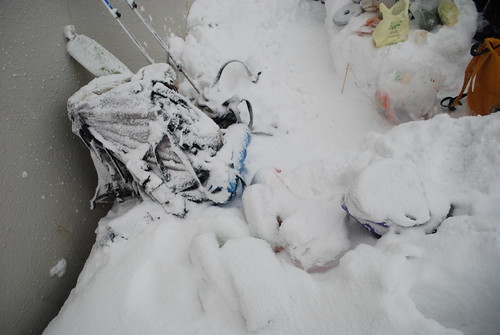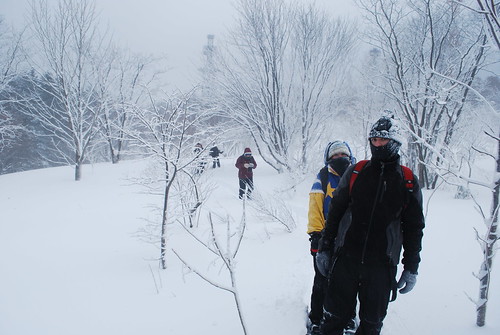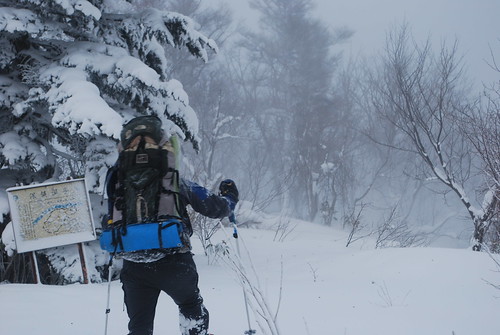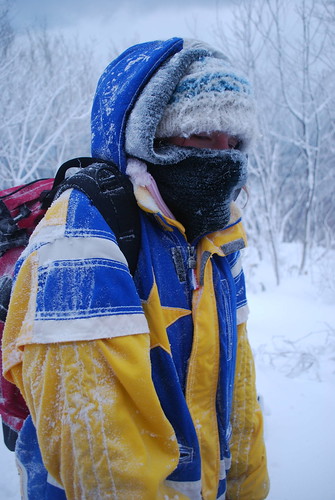Apparently this is the first installment in the “It’s February: GET OUT!” series, and it begins with a group of us JETs heading out for a snowshoe hike last Saturday February 6 as part of the HAJET (Hokkaido Association for JETs) Sapporo Yuki Matsuri (Sapporo Snow Festival) festivities (party). The destination was the fairly large city of Otaru, but our guide took us just outside of town and up into some hills that run along the Sea of Japan.
We started our trek in sunshine, the unfavourable weather forecast for hubuki a distant something that we try hard to ignore, avoid, and repress. Off the bus with two tied stacks of snowshoes and up through neighbourhoods we went, dodging the big yellow Tonka trucks in the process of digging them out.
The locals didn’t seem accustomed to having whitie visitors tromp past them, and they leered most strongly at our burly kiwi guide with his mountainous pack on his back. The undecided grey-shine we’d had on the early train in from Sapporo set up into full-on blue-sky glare just as we all finished strapping on our shoes and we took to the untouched rolling white.
Ken and I, the only Canadians, were given the biggest shoes of the bunch, and we chose to believe Leon when he told us it was for our Canuck prowess rather than for our bearish forms, far burlier than the gaggle of galls who were accompanying us. I wind up in Leon’s old shoes, which I deem an honour as he explains that they’ve been up so many mountains in Hokkaido as to likely have grown a sympathetic kind of EzoGPS.
Mere meters in, we hit our first hill, and you’d wonder if Leon, Kiwi guide and fearless leader, might now be testing us. That first mountain takes the measure of the only other guy in the group and finds him wanting. Just over the hill, we part company and he takes one of the last roads out back into town.
And then it’s just me and Ken and Leon and the Ladies. At a fairly nice lookout, indigo interesting clouds scuttle far out over the Sea of Japan, and from that cliff-top vantage point Ken damns us all by proclaiming, in jest, that it looks like a storm’s coming on.
Like the storm caller, he brings it down around us. We aren’t done another kilometer, taking in the last of the sun and blue on a completely unspoiled field of white that Leon saved for us special so we could do our own thing and blaze our own trails, when the grey comes in and the first of the flakes start falling in the woods beyond, as if beardy dustings down from the trees. We’re zipping our zips and we’re hooding our heads and we’re grabbing for gloves as the sun goes out and the cold comes in.
Thicker and thicker the white, and the wood is disappearing more and more. We break the last of the trees into another of those perfect fields, but in the ever steadier snow it stands like negative space, and anyone who isn’t a few steps in front of you gets negated in it.
Coming up on another of the many shrines we keep passing on the cliffs, in the woods, the wind kicks up for the first time, and the methodical vertical dumping starts to transform into an inconsistent, moving, almost-living thing. Amidst the gales of it, Leon has us hold up in the lee of the shrine, seeking some shelter as we food and we water. We’re more than an hour out from lunch, he advises, and the storm is here to stay.
And from that gaggle of ladies—from balmy States and British Isles—not a peep. Almost all of them are alien to such blustery abuses, and there’s not a modicum of dissent among them, not a suggestion of retreat. “On” they say in silence, and on we go: deeper into the woods and higher up the mountain.
Somewhere between tree and slope, the storm breaks, but seemingly only long enough for Ken to remark on it and, in so doing, call it all back down around us. Leon yields lead to Heather and I, and we take turns fighting the bluster to blaze our trail, sticking to breaks in the trees in this high place where Leon’s trail-cutting tracks from Tuesday have been obliterated utterly in the gusts and storms that have lashed in off the Sea of Japan.
The storm eventually causes Heather and I to yield, and Leon strikes out ahead again, making the last icy approach on our lunch site at the mountain’s summit. Only 400 meters of elevation, but that seems enough to have thrust us up into the clouds, where gusts of snow-studded wind roil with the form and rancor of lions.
Two o’clock, and we hunker in behind the base of a transmitter tower for lunch, Rambo Leon fashioning us a table and chairs out of the very snow itself before producing pots, stoves, water, cups, bowls, hashi, and all the ingredients for a fine nabe from his monstrous backpack. He serves us tea and hot chocolate with a civility unexpected at the heart of a raging blizzard, and we are all forced to master chopsticking with gloves on (no easy thing).
By the time we’re done and up and ready to go back out into it, our gear has almost vanished under all that’s fallen during our short break.
From the peak, we head down the far side of the mountain, through an open area where the storm blows strongest of all. The tone of it is set by Leon, who tells us to bunch up and to follow only when he waves us on. He ventures off into it, and he’s almost completely vanished in the white before he waves us to continue on: half walking and half sliding down the slope, the 80km/h gale robbing us of what little form we may have managed to glean over the course of the long day.
The hurricane gusts tear at our jackets and mitts and scarves, finding any crack where they can gain purchase, forcing in the white. Our every outer surface grows thick and white until we start to disappear into negative-space in the falling light. We pull our hats down low and our scarves up high against the driving snow, our small exposed eyeslits reminiscent of inuit explorer goggles.
And, somewhere between trees caked in ice and the growing drifts on our hats and shoulders and bags, we become one with the driven snow.




